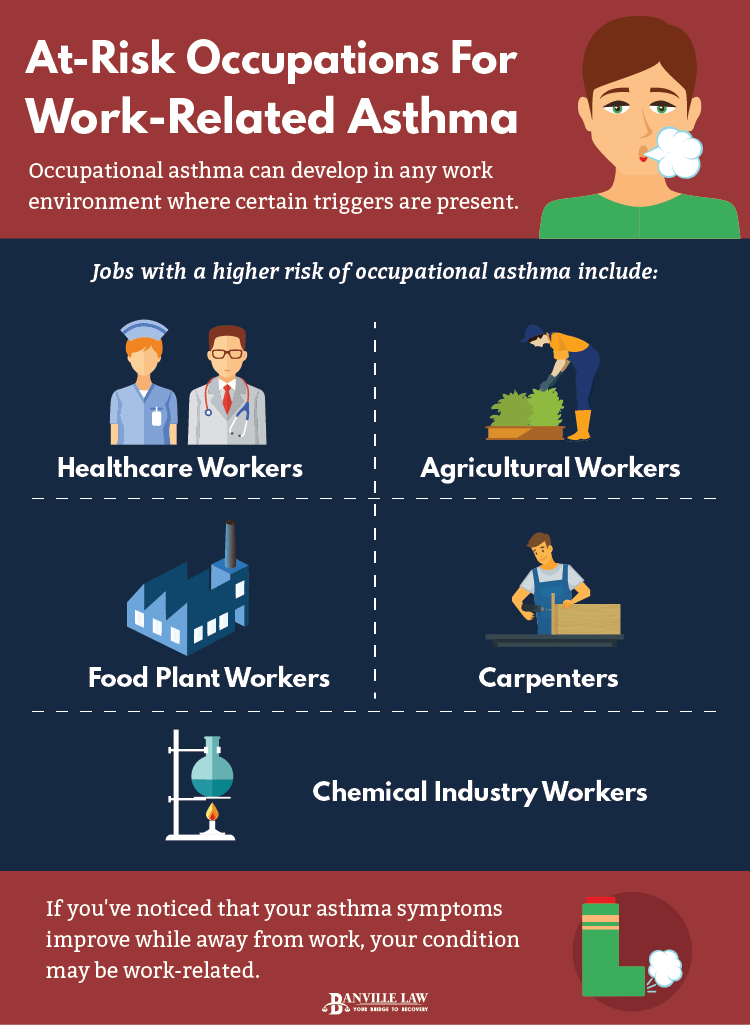If your workplace has caused you to develop an occupational illness like asthma, you may be wondering what to do next. Work-related asthma is a fairly common problem, as employees in certain occupations are regularly exposed to respiratory hazards which lead to the disease. This condition can severely limit your ability to do your job, and returning to the environment which caused the onset can only make it worse.
If you’ve developed asthma as an adult, or perhaps had your condition exacerbated by work-related factors, you may be entitled to workers’ compensation. These benefits provide workers with assistance for medical expenses and lost wages when a work-related injury or illness keeps them from returning to their jobs.
However, before you can receive compensation you must meet the requirements of the workers’ compensation board and get through a complicated claims process involving insurance companies and their lawyers. It’s important to provide detailed medical evidence that establishes a direct link to your workplace. This can be more challenging than it should be, as insurance companies may argue that your condition was preexisting or not work-related.
If you’ve been diagnosed with work-related asthma, you may wish to consider seeking legal counsel. This is often necessary in order to satisfy the requirements of the Board and to negotiate with skilled workers compensation law firm who specializes in finding reasons to deny claims.
In any case of adult-onset asthma, it’s important to consider the possibility that it could be work-related. Since we spend so much of our time at work, there is a good chance that factors in your work environment may have directly caused your asthma or made preexisting asthma much worse.
According to the US National Institutes of Health, physicians should always speak with new asthma patients about their work environments. However, it’s common for doctors to fail to ask this important question. If you’ve recently developed asthma-like symptoms, you should meet with a workers’ comp-approved doctor and bring up the possibility of an occupational relationship on your own.
If your asthma symptoms are worse on workdays and less severe on your days off, there is a good chance it’s work-related. Common symptoms of occupational asthma include:
Occupational asthma can occur in any workplace where potential triggers are present.

Jobs with an especially high risk include:
These are just a few common examples of workers at risk for occupational illness, but this disease can occur in any work environment where there is the risk of inhaling dusts, fumes, gases, or any other harmful substance.
If asthma or respiratory issues are keeping you from doing your job, it’s important to seek financial compensation so that you can address the problem. It may be difficult to provide the necessary medical and documents on your own, because diagnosing occupational asthma often takes time and several tests. However, an experienced New York occupational asthma lawyer can help guide you through the process.
Claims for occupational illnesses are usually more complex than those for work-related physical injuries. There are also complicated time limits regarding when you first received treatment, when you missed work, and when the onset of the disease occurred. Getting through this process on your own may seem impossible, but a lawyer who is well-versed in occupational illness workers’ comp claims can help you navigate the system.
Insurance companies are much more likely to deny your claim if you’re not represented by a lawyer. When they see that you have a respected lawyer in their corner, these companies are much less likely to force you to jump through hoops just to get the compensation you deserve. At Banville Law, we have the track record and experience you need in order to receive your compensation with little to no difficulty.
Can You Get Worker’s Compensation For Mental Illnesses? Find out here.